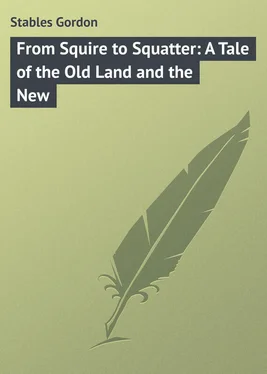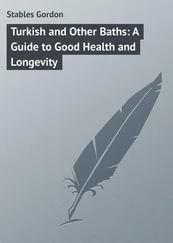Gordon Stables - From Squire to Squatter - A Tale of the Old Land and the New
Здесь есть возможность читать онлайн «Gordon Stables - From Squire to Squatter - A Tale of the Old Land and the New» — ознакомительный отрывок электронной книги совершенно бесплатно, а после прочтения отрывка купить полную версию. В некоторых случаях можно слушать аудио, скачать через торрент в формате fb2 и присутствует краткое содержание. Жанр: foreign_prose, foreign_children, на английском языке. Описание произведения, (предисловие) а так же отзывы посетителей доступны на портале библиотеки ЛибКат.
- Название:From Squire to Squatter: A Tale of the Old Land and the New
- Автор:
- Жанр:
- Год:неизвестен
- ISBN:нет данных
- Рейтинг книги:4 / 5. Голосов: 1
-
Избранное:Добавить в избранное
- Отзывы:
-
Ваша оценка:
- 80
- 1
- 2
- 3
- 4
- 5
From Squire to Squatter: A Tale of the Old Land and the New: краткое содержание, описание и аннотация
Предлагаем к чтению аннотацию, описание, краткое содержание или предисловие (зависит от того, что написал сам автор книги «From Squire to Squatter: A Tale of the Old Land and the New»). Если вы не нашли необходимую информацию о книге — напишите в комментариях, мы постараемся отыскать её.
From Squire to Squatter: A Tale of the Old Land and the New — читать онлайн ознакомительный отрывок
Ниже представлен текст книги, разбитый по страницам. Система сохранения места последней прочитанной страницы, позволяет с удобством читать онлайн бесплатно книгу «From Squire to Squatter: A Tale of the Old Land and the New», без необходимости каждый раз заново искать на чём Вы остановились. Поставьте закладку, и сможете в любой момент перейти на страницу, на которой закончили чтение.
Интервал:
Закладка:
But old Kate had given him a birthday present of a little Scotch Glengarry cap with a real eagle’s feather, and he always wore this in the hunting-field. He did so for two reasons; first, it pleased old Kate; and, secondly, the cap stuck to his head; no breeze could blow it off.
It was not long before Archie was known in the field as the “Little Demon Huntsman.” And, really, had you seen Scallowa and he feathering across a moor, his bonnet on the back of his head, and the pony’s immense mane blowing straight back in the wind, you would have thought the title well earned. In a straight run the pony could not keep up with the long-legged horses; but Archie and he could dash through a wood, and even swim streams, and take all manner of short cuts, so that he was always in at the death.
The most remarkable trait in Archie’s riding was that he could take flying leaps from heights: only a Shetland pony could have done this. Archie knew every yard of country, and he rather liked heading his Lilliputian nag right away for a knoll or precipice, and bounding off it like a roebuck or Scottish deerhound. The first time he was observed going straight for a bank of this kind he created quite a sensation. “The boy will be killed!” was the cry, and every lady then drew rein and held her breath.
Away went Scallowa, and they were on the bank, in the air, and landed safely, and away again in less time that it takes me to tell of the exploit.
The secret of the lad’s splendid management of the pony was this: he loved Scallowa, and Scallowa knew it. He not only loved the little horse, but studied his ways, so he was able to train him to do quite a number of tricks, such as lying down “dead” to command, kneeling to ladies – for Archie was a gallant lad – trotting round and round circus-fashion, and ending every performance by coming and kissing his master. Between you and me, reader, a bit of carrot had a good deal to do with the last trick, if not with the others also.
It occurred to this bold boy once that he might be able to take Scallowa up the dark tower stairs to the boy’s own room. The staircase was unusually wide, and the broken stones in it had been repaired with logs of wood. He determined to try; but he practised riding him blindfolded first. Then one day he put him at the stairs; he himself went first with the bridle in his hand.
What should he do if he failed? That is a question he did not stop to answer. One thing was quite certain, Scallowa could not turn and go down again. On they went, the two of them, all in the dark, except that now and then a slit in the wall gave them a little light and, far beneath, a pretty view of the country. On and on, and up and up, till within ten feet of the top.
Here Scallowa came to a dead stop, and the conversation between Archie and his steed, although the latter did not speak English, might have been as follows: “Come on, ‘Eider Duck’!”
“Not a step farther, thank you.”
“Come on, old horsie! You can’t turn, you know.”
“No; not another step if I stay here till doomsday in the afternoon. Going upstairs becomes monotonous after a time. No; I’ll be shot if I budge!”
“You’ll be shot if you don’t. Gee up, I say; gee up!”
“Gee up yourself; I’m going to sleep.”
“I say, Scallowa, look here.”
“What’s that, eh? a bit of carrot? Oh, here goes?” And in a few seconds more Scallowa was in the room, and had all he could eat of cakes and carrots. Archie was so delighted with his success that he must go to the castle turret, and halloo for Branson and old Kate to come and see what he had got in the tower.
Old Kate’s astonishment knew no bounds, and Branson laughed till his sides were sore. Bounder, the Newfoundland, appeared also to appreciate the joke, and smiled from lug to lug.
“How will you get him down?”
“Carrots,” said Archie; “carrots, Branson. The ‘Duck’ will do anything for carrots.”
The “Duck,” however, was somewhat nervous at first, and half-way downstairs even the carrots appeared to have lost their charm.
While Archie was wondering what he should do now, a loud explosion seemed to shake the old tower to its very foundation. It was only Bounder barking in the rear of the pony. But the sound had the desired effect, and down came the “Duck,” and away went Archie, so that in a few minutes both were out on the grass.
And here Scallowa must needs relieve his feelings by lying down and rolling; while great Bounder, as if he had quite appreciated all the fun of the affair, and must do something to allay his excitement, went tearing round in a circle, as big dogs do, so fast that it was almost impossible to see anything of him distinctly. He was a dark shape et preterea nihil .
But after a time Scallowa got near to the stair, which only proves that there is nothing in reason you cannot teach a Shetland pony, if you love him and understand him.
The secret lies in the motto, “Fondly and firmly.” But, as already hinted, a morsel of carrot comes in handy at times.
Chapter Five
“Boys will be Boys.”
Bob Cooper was as good as his word, which he had pledged to Archie on that night at Burley Old Farm, and Branson never saw him again in the Squire’s preserves.
Nor had he ever been obliged to compeer before the Squire himself – who was now a magistrate – to account for any acts of trespass in pursuit of game on the lands of other lairds. But this does not prove that Bob had given up poaching. He was discreetly silent about this matter whenever he met Archie.
He had grown exceedingly fond of the lad, and used to be delighted when he called at his mother’s cottage on his “Eider Duck.” There was always a welcome waiting Archie here, and whey to drink, which, it must be admitted, is very refreshing on a warm summer’s day.
Well, Bob on these occasions used to show Archie how to make flies, or busk hooks, and gave him a vast deal of information about outdoor life and sport generally.
The subject of poaching was hardly ever broached; only once, when he and Archie were talking together in the little cottage, Bob himself volunteered the following information:
“The gentry folks, Master Archie, think me a terrible man; and they wonder I don’t go and plough, or something. La! they little know I’ve been brought up in the hills. Sport I must hae. I couldna live away from nature. But I’m never cruel. Heigho! I suppose I must leave the country, and seek for sport in wilder lands, where the man o’ money doesn’t trample on the poor. Only one thing keeps me here.”
He glanced out of the window as he spoke to where his old mother was cooking dinner al fresco – boiling a pot as the gipsy does, hung from a tripod.
“I know, I know,” said Archie.
“How old are you now, Master Archie?”
“Going on for fourteen.”
“Is that all? Why ye’re big eno’ for a lad o’ seventeen!”
This was true. Archie was wondrous tall, and wondrous brown and handsome. His hardy upbringing and constant outdoor exercise, in summer’s shine or winter’s snow, fully accounted for his stature and looks.
“I’m almost getting too big for my pony.”
“Ah! no, lad; Shetlands’ll carry most anything.”
“Well, I must be going, Bob Cooper. Good-bye.”
“Good-bye, Master Archie. Ah! lad, if there were more o’ your kind and your father’s in the country, there would be fewer bad men like – like me.”
“I don’t like to hear you saying that, Bob. Couldn’t you be a good man if you liked? You’re big enough.”
The poacher laughed.
“Yes,” he replied, “I’m big enough; but, somehow, goodness don’t strike right home to me like. It don’t come natural – that’s it.”
Читать дальшеИнтервал:
Закладка:
Похожие книги на «From Squire to Squatter: A Tale of the Old Land and the New»
Представляем Вашему вниманию похожие книги на «From Squire to Squatter: A Tale of the Old Land and the New» списком для выбора. Мы отобрали схожую по названию и смыслу литературу в надежде предоставить читателям больше вариантов отыскать новые, интересные, ещё непрочитанные произведения.
Обсуждение, отзывы о книге «From Squire to Squatter: A Tale of the Old Land and the New» и просто собственные мнения читателей. Оставьте ваши комментарии, напишите, что Вы думаете о произведении, его смысле или главных героях. Укажите что конкретно понравилось, а что нет, и почему Вы так считаете.












